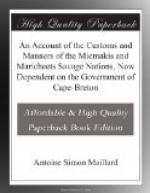The calumets lighted, and the tobacco burning with a clear fire, are scarce half smoked out, before the man of note before mentioned (for the greatest honors being paid him) gets up, places himself in the midst of the cabbin, and pronounces a speech of thanksgiving. He praises the master of the feast, who has so well regaled him and all the company. He compares him to a tree, whose large and strong roots afford nourishment to a number of small shrubs; or to a salutary medicinal herb, found accidentally by such as frequent the lakes in their canoes. Some I have heard, who, in their winter-feasts, compared him to the turpentine-tree, that never fails of yielding its sap and gummy distillation in all seasons: others to those temperate and mild days, which are sometimes seen in the midst of the severest winter. They employ a thousand similies of this sort, which I omit. After this introduction, they proceed to make honorable mention of the lineage from which the matter of the feast is descended.
“How great (will the oldest of them say) art thou, through thy great, great, great grand-father, whose memory is still recent, by tradition, amongst us, for the plentiful huntings he used to make! There was something of miraculous about him, when he assisted at the beating of the woods for elks, or other beasts of the fur. His dexterity at catching this game was not superior to our’s; but there was some unaccountable secret he particularly possessed in his manner of seizing those creatures, by springing upon them, laying hold of their heads, and transfixing them at the same time with his hunting-spear, though thrice as strong and as nimble again as he was, and much more capable with their legs only, than we with our rackets [a sort of buskined shoes made purposely for the Indian travels over the snow], to make their way over mountains of snow: he would nevertheless follow them, dart them, without ever missing his aim, tire them out with his chace, bring them down, and mortally wound them. Then he would regale us with their blood, skin them, and deliver up the carcass to us to cut to pieces. But if thy great, great, great grand-father made such a figure in the chace, what has not thy great, great grand-father done with respect to the beavers, those animals almost men? whose industry he surpassed by his frequent watchings round their cabbins, by the repeated alarms he would give them several times in one evening, and oblige them thereby to return home, so that he might be sure of the number of those animals he had seen dispersed during the day, having a particular foresight of the spot to which they would come to load their tails with earth, cut down with their teeth such and such trees for the construction of their huts. He had a particular gift of knowing the favorite places of those animals for building them. But now let us rather speak of your great grand-father, who was so expert at making of snares for moose-deer, martins, and elks. He had particular secrets, absolutely




